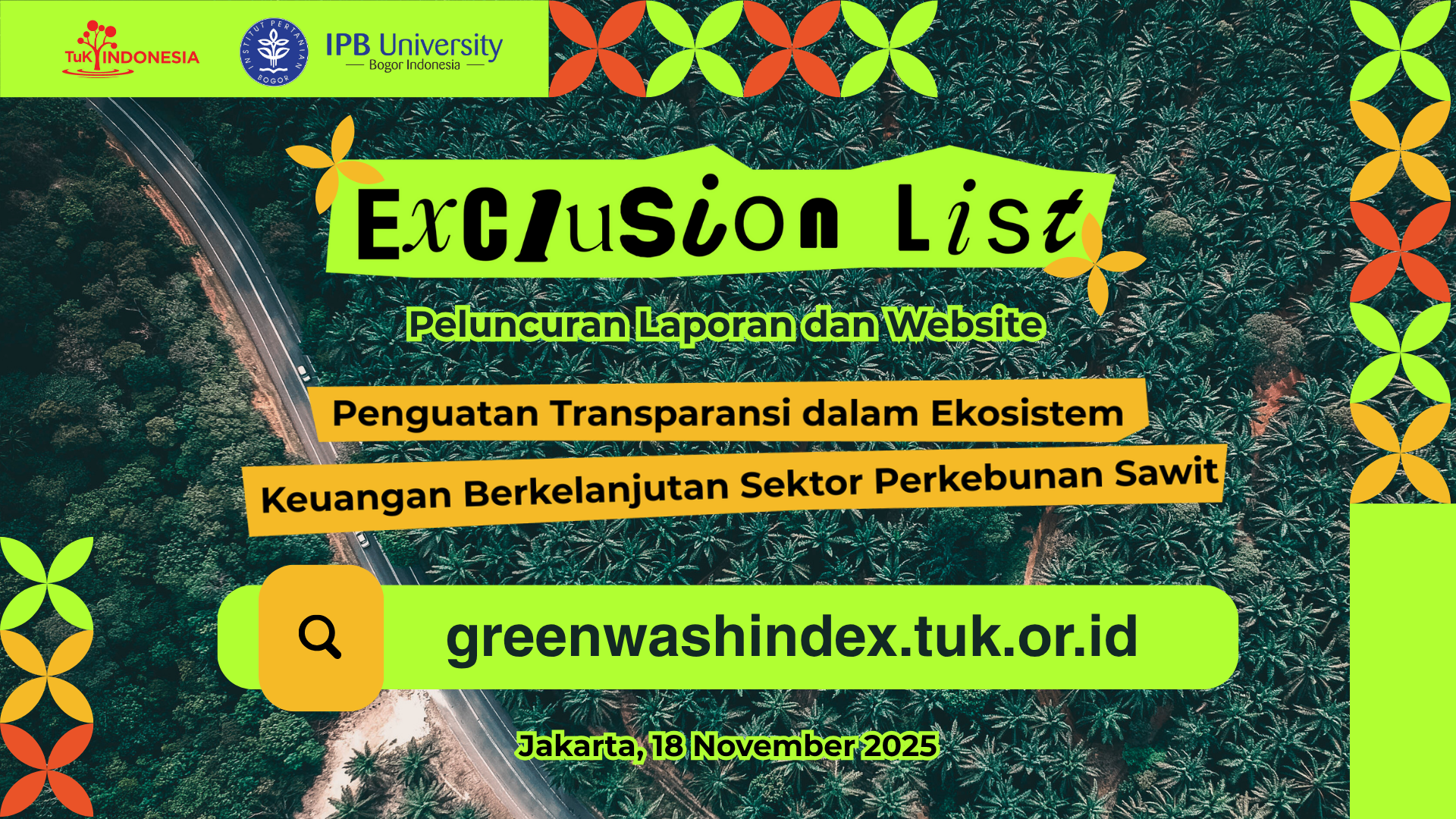20 November 2025 3 menit
TuK INDONESIA and IPB University Launch Palm Oil Sector Exclusion List to Strengthen Indonesia’s Sustainable Finance Ecosystem

Jakarta, 19 November 2025 — Transformasi untuk Keadilan Indonesia (TuK INDONESIA), together with the Center for Agrarian Studies–International Research Institute for Social, Economic, and Regional Development of IPB University (LRI IPB University), officially launched the Assessment and Development of the Palm Oil Sector Exclusion List, an instrument designed to help financial institutions identify and avoid high-risk financing in the palm oil sector (18/11).
Amid growing greenwashing practices and the lack of public transparency, the Exclusion List is expected to strengthen oversight and encourage higher sustainability standards in Indonesia’s palm oil sector.
TuK INDONESIA’s Executive Director, Linda Rosalina, emphasized that the Exclusion List is not a punitive tool, but one aimed at strengthening financial governance.
“Greenwashing remains widespread, especially when public data is inadequate. This Exclusion List helps financial institutions identify, manage, and avoid high-risk financing. It is intended to strengthen Indonesia’s sustainable finance ecosystem.” —Linda Rosalina
Head of LRI IPB University, Prof. Dr. Arya Hadi Dharmawan, explained that the Exclusion List is built on sustainability ethics.
“The ethical and moral standards we propose are not merely punitive; they ensure that palm oil plantations generate intergenerational benefits aligned with sustainability principles.” —Prof. Dr. Arya Hadi Dharmawan
He noted that every economic activity produces negative externalities—such as pollution and biodiversity loss—making precautionary principles essential. The instrument is also grounded in purpose-oriented finance, ensuring that every financing decision aligns with sustainability goals.
TuK INDONESIA’s Head of Advocacy and Public Education, Abdul Haris, revealed that assessments of 185 palm oil companies showed that most still fall below basic administrative and governance standards.
“Out of 185 companies, only 36 met the administrative criteria. How can a company be considered sustainable when it fails to meet basic administrative requirements? This reflects weak oversight and limited data availability—even within ISPO and RSPO certification systems.” —Abdul Haris
Chair of the Center for Agrarian Studies IPB University, Bayu Eka Yulian, stressed the importance of data transparency to achieve credible governance.
“The Exclusion List is a collaborative instrument. Transparency is key to enabling all stakeholders to discuss and ensure the direction of sustainable palm oil development. It is also an invitation for all parties to help safeguard the credibility of Indonesia’s palm oil sector.” —Bayu Eka Yulian
From the government side, Togu Rudianto Saragih, Regulatory Drafter at the Directorate General of Plantations, Ministry of Agriculture, affirmed the relevance of the Exclusion List to national regulatory mandates.
“We appreciate the initiative by TuK INDONESIA and IPB University. Law 39/2014 underscores the importance of public participation, yet its implementation remains weak. The Exclusion List can serve as an important tool to ensure companies remain compliant and transparent.” —Togu Rudianto Saragih
He also mentioned that while some companies have submitted reports voluntarily, the majority have yet to fulfill their obligations.
The launch of the Exclusion List is expected to help establish new standards for financing decisions, strengthen corporate governance, and safeguard community rights and the environment.
TuK INDONESIA and IPB University call on the government, financial institutions, businesses, civil society, and the public to use this list as a reference to strengthen oversight and encourage more responsible financing.
Documentation:
https://drive.google.com/drive/folders/1EyRTSmEEoeSuo2IhvluPdyD_IF1Q3sXC
Contact: Annisa (087884446640)
This post is also available in: Indonesian
